Compare Models
-
Stanford University
Alpaca
FREEStanford University released an instruction-following language model called Alpaca, which was fine-tuned from Meta’s LLaMA 7B model. The Alpaca model was trained on 52K instruction-following demonstrations generated in the style of self-instruct using text-davinci-003. Alpaca aims to help the academic community engage with the models by providing an open source model that rivals OpenAI’s GPT-3.5 (text-davinci-003) models. To this end, Alpaca has been kept small and cheap (fine-tuning Alpaca took 3 hours on 8x A100s which is less than $100 of cost) to reproduce. All training data and techniques have been released. The Alpaca license explicitly prohibits commercial use, and the model can only be used for research/personal projects, and users need to follow LLaMA’s license agreement. -
Technology Innovation Institute
Falcon-40B
OTHERThe Technology Innovation Institute (TII), an Abu Dhabi government funded research institution, has introduced Falcon, a state-of-the-art autoregressive decoder-only language model series released under the Apache 2.0 license, which means it can be used for commerical and research uses.
The family includes Falcon-40B and Falcon-7B, trained on 1 trillion tokens, mainly (>80%) from the RefinedWeb datase. A special variant, Falcon-40B-Instruct, has been made available which may be more suitable for assistant-style tasks. Falcon-40B can support English, German, Spanish, French (and limited capabilities in Italian, Portuguese, Polish, Dutch, Romanian, Czech, Swedish). It can be used to generate creative text and solve complex problems, chatbots, virtual assistants, language translation, content generation, and sentiment analysis (and more).To use these models, PyTorch 2.0 is required. TII is now calling for proposals from users worldwide to submit their most creative ideas for Falcon 40B’s deployment – https://falconllm.tii.ae/call-for-proposal.php or you can pay to access it via Amazon SageMaker JumpStart.
A demo of Falcon-Chat is available on Hugging Face at https://huggingface.co/spaces/HuggingFaceH4/falcon-chat. -
Technology Innovation Institute
Falcon-7B
FREEThe Technology Innovation Institute (TII), an Abu Dhabi government funded research institution, has introduced Falcon, a state-of-the-art autoregressive decoder-only language model series released under the Apache 2.0 license, which means it can be used for commerical and research uses. Falcon-7B only needs ~15GB and therefore is accessible even on consumer hardware. The model can support English, German, Spanish, French (and limited capabilities in Italian, Portuguese, Polish, Dutch, Romanian, Czech, Swedish). It can be used to generate creative text and solve complex problems, chatbots, customer service operations, virtual assistants, language translation, content generation, and sentiment analysis.
This raw pretrained model should be finetuned for specific use cases. Falcon-7B-Instruct is also available at https://huggingface.co/tiiuae/falcon-7b-instruct.
If you are looking for a version better-suited model to take generic instructions in a chat format, we recommend Falcon-7B-Instruct rather than the base model. -
NVIDIA
NeMo
FREENVIDIA NeMo, part of the NVIDIA AI platform, is an end-to-end, cloud-native enterprise framework to help build, customize, and deploy generative AI models. NeMo makes generative AI model development easy, cost-effective and fast for enterprises. NeMo has separate collections for Automatic Speech Recognition (ASR), Natural Language Processing (NLP), and Text-to-Speech (TTS) models. Each collection consists of prebuilt modules that include everything needed to train on your data. NeMo framework supports both language and image generative AI models. Currently, the workflow for language is in open beta, and the workflow for images is in early access. You must be a member of the NVIDIA Developer Program and logged in with your organization’s email address to access it. It is licensed under the Apache License 2.0, which is a permissive open source license that allows for commercial use. -
LMSYS Org
Vicuna-13B
FREEVicuna-13B is an open-source chatbot developed by a team of researchers from UC Berkeley, CMU, Stanford, MBZUAI, and UC San Diego. The chatbot was trained by fine-tuning LLaMA on user-shared conversations collected from ShareGPT. There is a 13B and 7B parameter models that are available on Hugging Face.
Vicuna-13B achieves more than 90% quality of OpenAI ChatGPT and Google Bard while outperforming other models like LLaMA and Stanford Alpaca in more than 90% of cases. The code and weights and an online demo are publicly available for non-commercial use. Here is a link to learn more about how it compares to other models – https://lmsys.org/blog/2023-03-30-vicuna/.
To use this model, you need to install LLaMA weights first and convert them into Hugging Face weights, and the cost of training Vicuna-13B is around $300.





